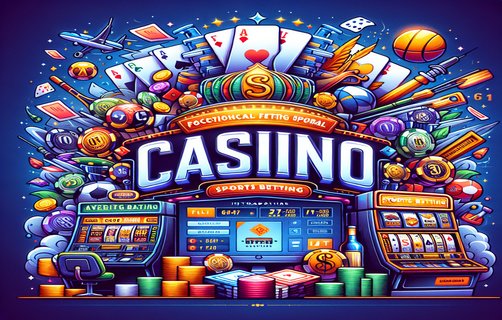Mastering Poker: Strategies for Success
पोकर में महारत: सफलता के लिए रणनीतियाँ
Poker is a game that intertwines psychology, mathematics, and strategic decision-making. The essential element for any player who wishes to excel is understanding how to optimize their profit strategy. Each move at the table becomes a complex woven tapestry of short-term goals, long-term aspirations, and calculated risks.
To begin with, evaluating and adjusting your profit strategy is paramount. Each game provides fresh data, a canvas of human behavior that can inform your decisions. If you notice opponents’ tendencies towards aggression or passivity, adjust your betting patterns accordingly. An effective way to identify these patterns is to meticulously observe not just the cards they play, but also their reaction to various board states and your actions.
Winning formulas in poker aren’t always mathematical; they can often be nuanced and require a keen understanding of human psychology. The ability to read facial movements—micro-expressions, in particular—can provide insights into your opponent's state of mind. A furrowed brow may hint at uncertainty, while a relaxed demeanor might suggest confidence in their hand. Paying attention to these subtleties can give you the edge over less observant players.
Moreover, maintaining a calm decision-making process is crucial to successful betting. Emotional turbulence can lead to poor choices, making it essential to remain composed. Techniques such as deep breathing or taking a brief moment to evaluate before acting can help ground your strategy, ensuring that you approach each hand with clarity and focus.
Short-term goals should also drive your play. In a game defined by swings—hot streaks and cold spells—planning for the immediate future can prevent you from losing sight of gradual profitability. Set realistic goals for individual sessions, whether that’s optimizing losses by a few stacks or ensuring a net gain for the day. This method instills discipline, allowing your success to accumulate steadily over time.

Decision-making is also greatly enhanced by understanding your own play patterns. Are you prone to playing too aggressively when in a position of power? Recognizing these habits allows you to adjust your strategy. For instance, if you tend to bluff frequently, consider balancing this by occasionally playing strong hands in a similarly aggressive manner to confuse your opponents.
Lastly, the essence of poker lies in the ability to adapt. As the dynamics of the game evolve, whether through shifts in your table’s play style or your current chip stack, your strategy must evolve in tandem. This adaptability not only keeps you competitive but also preserves your edge as a savvy player who can navigate through the complexities of poker with deft precision.

पोकर एक ऐसा खेल है जो मनोविज्ञान, गणित और रणनीतिक निर्णय लेने के बीच का तार बनाता है। किसी भी खिलाड़ी के लिए जो उत्कृष्टता हासिल करना चाहता है, यह समझना आवश्यक है कि कैसे अपने लाभ रणनीति का अनुकूलन करें। तालिका पर हर कदम एक जटिल बुनाई ताना होता है, जिसमें अल्पकालिक लक्ष्यों, दीर्घकालिक आकांक्षाओं और गणनापूर्ण जोखिम शामिल होते हैं।
शुरू में, आपकी लाभ रणनीति का मूल्यांकन और समायोजन अत्यंत आवश्यक है। हर खेल नए डेटा प्रदान करता है, मानव व्यवहार का एक कैनवास जो आपके निर्णयों को सूचित कर सकता है। यदि आप अपने विरोधियों की आक्रामकता या निष्क्रियता की प्रवृत्तियों का अवलोकन करते हैं, तो उसके अनुसार अपनी दांव लगाने की रणनीतियाँ समायोजित करें। इन पैटर्नों की पहचान करने का एक प्रभावशाली तरीका यह है कि आप न केवल उनके खेल के पत्तों पर ध्यान दें, बल्कि विभिन्न बोर्ड अवस्थाओं और आपके कार्यों के प्रति उनकी प्रतिक्रियाओं का भी बारीकी से अवलोकन करें।
पोकर में जीतने के सूत्र हमेशा गणितीय नहीं होते; वे अक्सर सूक्ष्म होते हैं और मानव मनोविज्ञान की एक गहरी समझ की आवश्यकता होती है। चेहरे की हरकतों को पढ़ने की क्षमता—विशेष रूप से सूक्ष्म-व्यक्तित्व—आपको आपके विरोधियों की मानसिकता में अंतर्दृष्टि प्रदान कर सकती है। एक झुर्रीदार भौंह अनिश्चितता की ओर इशारा कर सकती है, जबकि एक आरामदायक मुद्रा अपने हाथ में विश्वास को दर्शा सकती है। इन बारीकियों पर ध्यान देना आपको कम जागरूक खिलाड़ियों पर बढ़त दिला सकता है।
आगे बढ़ते हुए, शांत निर्णय लेने की प्रक्रिया को बनाए रखना सफल दांव के लिए आवश्यक है। भावनात्मक उथल-पुथल खराब विकल्पों की ओर ले जा सकती है, इसलिए संयमित रहना महत्वपूर्ण है। गहरी साँस लेने या कार्रवाई करने से पहले थोड़े क्षण का मूल्यांकन करना जैसे तकनीकें आपकी रणनीति को आधार देती हैं, यह सुनिश्चित करती हैं कि आप प्रत्येक हाथ का सामना स्पष्टता और ध्यान केंद्रित करके कर सकें।
अल्पकालिक लक्ष्य भी आपके खेल को प्रेरित करना चाहिए। एक ऐसे खेल में जो झूलों से परिभाषित होता है—गर्मी के आँकड़े और ठंडी जड़ी-बूटियाँ—तुरंत भविष्य के लिए योजना बनाना आपको क्रमागत लाभप्रदता से न चूकने में मदद करता है। व्यक्तिगत सत्रों के लिए व्यवहारिक लक्ष्य निर्धारित करें, चाहे वह थोड़े ढेर को अनुकूलित करना हो या दिन के लिए कुल लाभ सुनिश्चित करना हो। यह विधि अनुशासन को मजबूती देती है, जो समय के साथ आपके सफलता के लिए एकत्रित करने की अनुमति देती है।
निर्णय लेने की प्रक्रिया को अपने खेल की पैटर्नों को समझने से भी बहुत बढ़ाया जा सकता है। क्या आप शक्ति की स्थिति में बहुत आक्रामक होने की प्रवृत्ति रखते हैं? इन आदतों को पहचानना आपकी रणनीति को समायोजित करने की अनुमति देता है। उदाहरण के लिए, यदि आप बार-बार धुंधला करने की प्रवृत्ति रखते हैं, तो विरोधियों को भ्रमित करने के लिए एक समान आक्रामक तरीके से कभी-कभी मजबूत हाथ खेलने के द्वारा इसे संतुलित करने पर विचार करें।
आखिरकार, पोकर का सार अनुकूलन की क्षमता में निहित है। जैसे-जैसे खेल की गतिशीलता विकसित होती है, चाहे वह आपकी तालिका के खेलने की शैली में बदलाव हो या आपकी वर्तमान चिप स्टैक्स, आपकी रणनीति को इस क्रम में विकसित होना चाहिए। यह अनुकूलन न केवल आपको प्रतिस्पर्धात्मक बनाए रखता है, बल्कि एक प्रतिभाशाली खिलाड़ी के रूप में आपकी बढ़त को भी बनाए रखता है, जो पूरी कुशलता से पोकर की जटिलताओं को नेविगेट कर सकता है।

comments
PokerPro
This article lays out amazing strategies for both newbies and seasoned players.
BluffMaster
I loved the focus on psychological aspects; reading faces is crucial in poker!
AceHigh
Short-term goals really help keep my game in check. Great insights!
ChipLeader
Adjusting my strategies based on play patterns has changed my game significantly.
FoldEm
I found the tips on staying calm during critical decisions really helpful.
RoyalFlush
Poker isn't just cards; the psychology makes it so much more engaging!